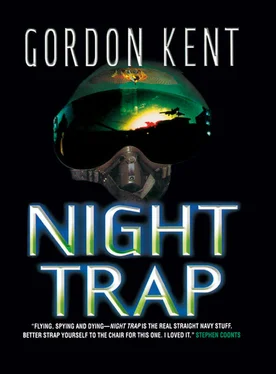Now, he knew that a rain of anti-radiation missiles had begun. To turn a radar on was to invite death; he did not. Yet, through the eyes of a radar on a hill thirty miles behind him, he was able to watch the Americans come on.
The trailer door opened; a surprisingly courteous voice said, “Who is in charge, please?” It was a Revolutionary Guard full colonel. Everybody but Franci’s officer pointed at Franci.
“I am in charge,” the officer said.
“Show me the situation.”
The officer turned smoothly to Franci. “Show the colonel the situation.”
Franci didn’t care who got the credit or what the pecking order was; he was caught up in the pleasure of doing the job. “They are coming in two strikes from the carriers, about forty miles apart. Northern strike will pass directly over us—unless we’re the target, Allah forbid. Seven minutes to arrival.”
The colonel handed him a cellular telephone. “Pass course and speed data to my shooter. No radar illumination until you are so ordered.”
Franci was enthusiastic about not illuminating the radar: why make themselves a target?
The colonel left the trailer; Franci’s officer teetered on his toes and watched the clock; Franci passed data and plotted vectors. Six minutes. Five minutes. Four. Three.
The Revolutionary Guard detachment fired their mysterious missile at six miles. Radar recorded one plane falling below the formation—an evident hit. Franci reported it on the cellphone.
“Illuminate your radar. Fire all missiles, whether targeted or not. This is a direct order from the colonel.” It was like an order to commit suicide.
His fire-control radar stayed on for less than ten seconds before a HARM missile, launched minutes before, identified it as a first-priority target and zeroed in.
Franci felt the earth heave, and God reached for him.
A new signal had just lanced out from the mainland. Alan hooked it and read its stats. Weird—not anything he remembered. He leafed through his notes and didn’t find it. Then, too quickly, it disappeared and he was left to log it. Somewhere in the parameters of a Chinese early warning radar , he thought. It had been on only eight seconds. Maybe somebody had shot it with a HARM. Maybe its operator had panicked at what he saw and shut down.
It had gone on within seconds of the feet-dry time and within four miles of the northern target group’s route. It must have seen the whole northern strike package. Alan dialed up Strike Common, the radio frequency on which most chatter would occur when EMCON was dropped.
“Touchdown,” a voice in his helmet said. EMCON was over.
“Packers!” another voice cried, and the plane seemed to drop out from under him.
Packers were unfriendly aircraft that had leaked through the forward screen. To four men riding a big, fat grape, the word meant danger. Alan had a brief recall of an argument in CVIC about whether the tankers would be too close to the coast. We are, we are .
Rafe had the plane in a dive for the surface.
Alan punched up his datalink display. Christine gave a faint whine.
The display died.
“Shit, Senior! We lost the back end,” Alan groaned. Without conscious thought, he reached up, toggled the system switch off, counted ten, and toggled it on again.
Christine continued to dive.
As Alan tried to urge a glimmer from Christine’s brain, he checked and rechecked the chaff and flare counters above his head.
“Dumped the load,” he said into the mike. His anxiety showed in his voice. When you do a cold dump in an S-3 you lose a lot—not least the ability to see if the Packer is after you.
Rafe came on the line. He had long since got his confidence back after the double bolter, and four months of flying had made his decisions crisper. He was busy just then, but this was what he was trained for, no bullshit, just flying. “Masks on. Spy, get that fucking computer up and tell me what’s happening. Chaff and flare are armed.”
Alan reached up and fired a chaff/flare sequence. The numbers counted down; three chaff, two flares down, plenty to go. “Chaff/flare checks good, Senior’s got a reinit.” Alan’s fingers flew. He input the vital data—targets and known SAM sites—while Senior struggled to restore the datalink. Alan had to reinput his hotlist of radar contacts. When he hit the input button he saw that Senior had the datalink back up—and the news was bad.
Senior Chief Craw was drawling into the headset, “One bandit southeast nineteen NM and heading right at us. About 540 knots.”
“Spy! What is it? MiG-29?”
If it is we’re dead , he thought. Where the hell is our CAP? We had an F-14 out here ten minutes ago; his wingman had a hydraulics failure, but—
Alan found their missing CAP just as Narc did. “Fucking REO!” Narc shouted. Their protection had done his job and made a run at the intruder, but a nervous NFO and an inexperienced pilot had ended in a missed intercept and a bad shot. Narc had their Fighter Common on his comm and was trying to get the Tomcat back.
The intruder continued to bear down on them.
Why didn’t he turn and engage the Tomcat? He didn’t even seem to know that the fighter was there. Alan looked at his datalink and got a radar cut that ran like a sword through the unid box. The cut was rare; in effect, it was unknown, not present in the laundry list of radars and attached planes flown by threat countries. His head, however, unlike the datalink, was stuffed with such unconsidered trifles: he knew what it was.
“Chinese-built A-5 Fantan! Two Atoll AA missiles, shitty little radar. Rafe, get below eight hundred feet and he can’t get a tone with his birds.”
Rafe liked knowledge. He also liked certainty, and Alan sounded absolutely certain. And it was better than nice that it was a third-world pilot in a first-generation piece of shit chasing him, not some Russian mere in a MiG-29—an F-18 in drag—looking for a score.
“Okay, got it, we’re going through two thousand and I’d really like to know his stall speed and has he got a gun?”
Alan had his kneeboard packet open and the A-5 card was glaring at him, printed for some reason on fluorescent orange card stock. “Two 20-millimeters. 165 knots clean. Worse for this guy, he’s got to have a drop.”
He looked at the screen; Christ he’s close , Alan thought, and all hell broke loose.
“Chaff flare!” shouted Narc, and he fired the sequence himself from the front. Narc’s RAW gear showed a launch somewhere behind him. Alan leaned forward against the power of the dive and tried to read their altitude. “Below 1000!” he said, and Rafe pulled hard to the right, worse than the hardest break Alan had ever seen, and moonlit sea reached up hungrily toward the Senior’s porthole to pull Christine down. The altimeter was now at two hundred feet: Christine did not believe in registering lower altitudes. Alan forced his arm up against the G force and put the chaff on automatic. He suddenly didn’t trust all the data ingested at intel school. Had anybody ever actually fought an A-5? Fuck, what if all the intelligence was bullshit? Wasn’t that the point Peretz had tried to make to him?
Rafe rolled the plane 180 degrees and started a more comfortable turn. A flash went by Alan’s porthole. “Missiles timed out,” Alan said, mostly sure that he was right. Craw was shouting on Strike Common, but nobody was going to save them; they were too far from the strike package and too far from the ship. In five minutes, every Tomcat and Hornet in naval aviation would be crisscrossing this airspace in search of air medals, but five minutes is an age in aerial combat and this was now.
Читать дальше












